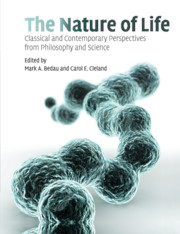Book contents
- Frontmatter
- Contents
- Preface
- Acknowledgments
- Sources
- About the authors
- Introduction
- SECTION I CLASSICAL DISCUSSIONS OF LIFE
- 1 De Anima (selections)
- 2 Treatise on Man
- 3 Critique of the teleological power of judgment (selections)
- 4 What is Life? (selections)
- 5 The nature of life
- 6 What is the meaning of “life”?
- 7 The principles of life (selections)
- SECTION II THE ORIGIN AND EXTENT OF NATURAL LIFE
- SECTION III ARTIFICIAL LIFE AND SYNTHETIC BIOLOGY
- SECTION IV DEFINING AND EXPLAINING LIFE
- Supplementary bibliography on life
- Index
- References
3 - Critique of the teleological power of judgment (selections)
Published online by Cambridge University Press: 10 November 2010
- Frontmatter
- Contents
- Preface
- Acknowledgments
- Sources
- About the authors
- Introduction
- SECTION I CLASSICAL DISCUSSIONS OF LIFE
- 1 De Anima (selections)
- 2 Treatise on Man
- 3 Critique of the teleological power of judgment (selections)
- 4 What is Life? (selections)
- 5 The nature of life
- 6 What is the meaning of “life”?
- 7 The principles of life (selections)
- SECTION II THE ORIGIN AND EXTENT OF NATURAL LIFE
- SECTION III ARTIFICIAL LIFE AND SYNTHETIC BIOLOGY
- SECTION IV DEFINING AND EXPLAINING LIFE
- Supplementary bibliography on life
- Index
- References
Summary
ON THE OBJECTIVE PURPOSIVENESS WHICH IS MERELY FORMAL, IN DISTINCTION TO THAT WHICH IS MATERIAL
All geometrical figures that are drawn in accordance with a principle display a manifold and often admired objective purposiveness, namely that of serviceability for the solution of many problems in accordance with a single principle, and indeed of each of them in infinitely many different ways. The purposiveness here is evidently objective and intellectual, not, however, merely subjective and aesthetic. For it expresses the suitability of the figure for the generation of many shapes aimed at purposes, and is cognized through reason. But the purposiveness still does not make the concept of the object itself possible, i.e., it is not regarded as possible merely with respect to this use.
In such a simple figure as the circle there lies the basis for the solution of a host of problems, for each of which by itself much preparation would be required, and which as it were arises from this figure itself as one of its many splendid properties. If, e.g., the problem is to construct a triangle from a given baseline and the angle opposite to it, then it is indeterminate, i.e., it can be solved in infinitely many ways. But the circle comprehends them all, as the geometrical locus for all triangles that satisfy this condition.
- Type
- Chapter
- Information
- The Nature of LifeClassical and Contemporary Perspectives from Philosophy and Science, pp. 21 - 49Publisher: Cambridge University PressPrint publication year: 2010



